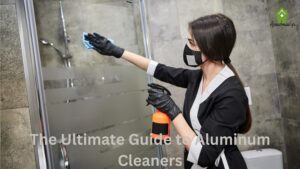
Ever looked at your aluminum rims, outdoor furniture, or your trusty pontoon boat and thought, “Why does this look so dull?” Aluminum may be strong and versatile, but it sure likes to throw a tantrum in the form of stains, discoloration, or that chalky white haze (known as oxidation). Don’t worry—we’re here to help you bring back that sparkling luster with the ultimate guide on aluminum cleaners.
This section will take you through why cleaning aluminum matters, some common cleaning struggles, and how to overcome them like a pro. Keep reading, and you’ll soon be wowing everyone with your shiny metal surfaces!
Why Cleaning Aluminum is More Than Just About Looks
At first glance, it might seem like cleaning aluminum is just a matter of “tidying up” for the sake of appearances. Who doesn’t love a shiny finish, right? But here’s the thing: cleaning your aluminum isn’t just about making it look nice; it’s also a big deal for functionality and durability.
1. Preventing Oxidation
Oxidation on aluminum happens when the surface reacts with oxygen over time, leaving a chalky, dull white coating. While oxidation itself acts as a form of protection against further corrosion, it can harm the look, reduce surface smoothness, and impair performance in certain applications (think boats or machinery). Regular cleaning helps keep this buildup in check.
2. Boosting Durability
Dirty aluminum surfaces can accumulate grime like road salt, grease, and industrial pollutants. Left unchecked, these particles can slowly wear away the surface, leading to scratches or even corrosion. Cleaning the metal periodically ensures that these harmful elements don’t stick around long enough to do damage.
3. Restoring Functionality
Take your aluminum cookware, for example. A pan with grease stains or tarnished spots doesn’t cook as efficiently. Or consider aluminum pontoons on a boat—with buildup underneath, you might lose that smooth glide across the water. Cleaning keeps everything working as it’s supposed to.
4. It’s Just More Fun When It Looks Great!
Lastly, there’s that feel-good factor. Whether it’s your bike, car rims, or lovely patio furniture, seeing them sparkle just makes you smile. Plus, showing off a clean finish says a lot about the care and pride you put into your belongings.
The Common Challenges You’ll Face When Cleaning Aluminum
Wouldn’t it be great if aluminum just cleaned itself? Sadly, life doesn’t work that way. Cleaning aluminum has its fair share of challenges, but luckily, we’ve got you covered.
1. Oxidation Stains That Won’t Budge
Oxidation is probably the trickiest villain in the aluminum cleaning world. It doesn’t come off easily with just soap and water, which leads people to harsh cleaning agents or intensive scrubbing that might scratch the surface.
Tip: Specialized aluminum cleaners are packed with the right ingredients to combat oxidation without damaging the surface.
2. Water Stains and Spotting
If you’ve cleaned aluminum before, you’ve likely battled with water spots. These pop up when water dries on the surface, leaving behind minerals like calcium or magnesium. Annoying, right?
Tip: To avoid spotting, always dry aluminum thoroughly after rinsing. You can even use a microfiber cloth to ensure a streak-free finish.
3. Scratches from Improper Tools
Steel wool pads or abrasive brushes might seem like the easy way to clean aluminum, but they can make things worse by scratching the surface. Once scratched, aluminum loses its smooth texture and becomes even harder to maintain.
Tip: Always use non-abrasive tools like soft sponges or brushes made specifically for aluminum.
4. Finding the Right Cleaner
Not every aluminum cleaner is created equal. Some are eco-friendly, while others are industrial-strength but harsh on surfaces. Some are liquids, while others are gels or even sprays. Finding the perfect match for your aluminum can feel like a treasure hunt.
Tip: Start by identifying your cleaning needs. Are you tackling cookware, pontoons, or car rims? Once you narrow down your focus, picking a cleaner isn’t so overwhelming.
5. Balancing Safety and Effectiveness
Using aluminum cleaners that are too harsh can harm the surface or pose health risks if used in poorly ventilated spaces. On the other hand, overly mild cleaners might fail to get the job done, leaving you frustrated.
Tip: Look for well-balanced, reliable aluminum cleaners with clear instructions and safety certifications like “EPA Safer Choice.”
6. DIY Cleaner Dilemmas
Many people experiment with making their own aluminum cleaners using items like baking soda, vinegar, or lemon juice. These DIY solutions can work for light stains but often fall short for tougher oxidation or grease.
Tip: While homemade solutions are great for quick fixes, know when to call in the big guns (aka a professional aluminum cleaner).
Why Choosing the Right Aluminum Cleaner Matters
Selecting the best aluminum cleaner can make all the difference. Here’s why choosing the right formula is so important for a successful cleaning job.
1. Type of Surface
Aluminum surfaces differ in their needs. For instance, pots and pans require food-safe cleaners, while pontoons need something that works great on large, oxidized surfaces without streaking.
2. Eco-Friendly Options
If you’re conscious about the environment, skip cleaners with harsh acids or chemicals. Eco-friendly aluminum cleaners use plant-based ingredients or non-toxic formulas that are safer for your family and the planet.
3. Ease of Application
Who wants to wrestle with overly complicated instructions before cleaning? Look for high-foaming, easy-to-rinse options when picking your aluminum cleaner. Some are even available in convenient spray bottles for quick application.
4. Long-Term Benefits
A great cleaner doesn’t just remove the grime; it also helps slow down future buildup, keeping your aluminum looking fabulous for longer. Many products also contain ingredients that restore shine and keep oxidation at bay.
Aluminum Cleaning Tips and Tricks
Want to get the most out of your aluminum cleaning routine? These tried-and-true tips will keep you ahead of the game.
- Pre-Rinse the Surface: Always start with a quick rinse to remove loose dirt and grime.
- Test Cleaners on a Small Area: Before you commit, test the cleaner on an inconspicuous spot to see how it reacts to your aluminum.
- Dilution is Key (if applicable): Many cleaners come in concentrated formulas, so read the label carefully before using.
- Apply from One Direction: This keeps the cleaner from pooling or streaking in uneven areas.
- Rinse Thoroughly: Leftover residue might cause discoloration or streaks, so be thorough when rinsing.
FAQ – Common Aluminum Cleaning Questions
Q1. What’s the best aluminum cleaner for oxidation?
Look for products specially formulated for tough oxidation, such as ALuma-Brite or similar brands. They are designed to remove oxidation without damaging the underlying surface.
Q2. Are there eco-friendly aluminum cleaners?
Yes! Many companies offer biodegradable and non-toxic aluminum cleaners certified by organizations like EPA Safer Choice. These are perfect for families and safe for the environment.
Q3. Can I use vinegar to clean aluminum?
Vinegar can clean light stains on aluminum, but it’s not effective for heavy oxidation or grease. Professional cleaners are a better choice for tough jobs.
Q4. How often should I clean aluminum surfaces?
It depends on usage. Outdoor furniture and pontoons may need cleaning every few months, while cookware might require weekly maintenance.
Q5. Can I use aluminum cleaner on polished aluminum?
Check the label. Some cleaners are too harsh and may dull shiny, polished aluminum. Always verify compatibility before cleaning.
Now that you’re armed with all the basics of aluminum cleaning, tackling even the most stubborn stains should feel a lot less daunting. With the right cleaner and a few handy tips, you’re just a few steps away from sparkling, refreshed aluminum that looks brand new. Stay tuned for the next sections, where we’ll explore the top-rated products and step-by-step cleaning guides!









